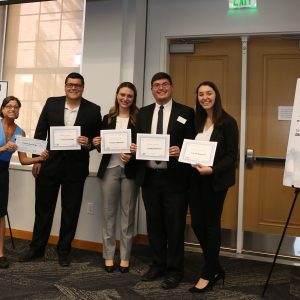Doctor of Business Administration degree central to former Congressman Jason Altmire’s next chapter
Combining his years of business and legislative experience, Altmire focused his dissertation on the effectiveness of businesspeople in Congress.
Jason Altmire (DBA ’20) has spent his career between two of his passions – business and politics.
His early work as a legislative assistant on Capitol Hill and later position as a hospital executive in his home state of Pennsylvania would set the foundation for his three terms in the U.S. House of Representatives and role as Senior Vice President for Public Affairs at Florida Blue.
As the representative for Pennsylvania’s 4th Congressional District from 2007-2013, Altmire spearheaded 29 different legislative initiatives that became law. A consensus builder by nature, he introduced a bill that gained the most cosponsors of any congressional bill in American history – 432 of the 435 House members.
When asked which personal accomplishment he is most proud of during his time in office, he said it was leading the rescue mission to help two of his constituents who ran an orphanage in Haiti during the country’s devastating 2010 earthquake. In the chaotic aftermath of the quake, Altmire traveled to Haiti to help them return to the United States with 54 Haitian orphans who became American adoptees.
“It’s one of those things that you look back on and really feel like you made a difference,” Altmire said, noting also that all of the orphans are now U.S. citizens.
Much like his career, Altmire’s legislative work and beliefs were centered between two sides, in this case, the left and the right. According to the nonpartisan National Journal, Altmire’s voting record in Congress ranked him No. 218, the dead center, of all 435 U.S. House members when ranked from most liberal to most conservative. This rating would inspire him to write a book about his experience as a bipartisan centrist in Congress: “Dead Center: How Political Polarization Divided America and What We Can Do About It.”
“The book is a non-partisan look at our government,” Altmire said. “I believe the most important issue we face today in American politics is polarization. We’re supposed to work with both sides and negotiate, but that doesn’t happen in Washington or in our public discourse.”
Altmire’s book uses examples from social science research to highlight the importance of bipartisanship and offers realistic solutions on how we can move away from a polarized political environment. In researching the studies, Altmire was inspired to pursue another area of personal passion – higher education.
With the goal of combining his background in business and drive to learn more about academic research, Altmire found his place in the University of Florida’s Doctor of Business Administration program.
“The people who lead and teach in the UF DBA program are the absolute best at what they do in scholarly research in the world,” Altmire said. “No matter the field, it’s taught by someone who is an expert and a leading researcher.”
The experts who teach in the UF DBA program, like Drs. Joyce Bono and Phil Podsakoff, led Altmire to his most significant takeaway from his time pursuing his doctorate – research can be used, and is necessary, to make business decisions.
“The UF DBA gives practical, real-world insights that you can use to be a better leader and make more informed decisions,” he said.
Altmire took this lesson to heart with his dissertation, which he successfully defended almost a year ahead of when it was scheduled. In his research, “Do Businesspeople Make Good Lawmakers?” Altmire combines his business and political background to study whether businesspeople make effective legislators.
While taking classes with Associate Dean and Fisher School of Accounting Director Gary McGill and Associate Professor of Management David Gaddis Ross, Altmire noted the personality differences between accountants and entrepreneurs, deciding to use these two primary types of businesspeople as the subjects for his research.
“Specifically, I looked at the known personality traits of both accountants and entrepreneurs and compared them to known personality traits of successful legislators,” Altmire said.
Overall, Altmire found that businesspeople are generally less successful legislators. Specifically, accountants tend to be much less successful in Congress, while entrepreneurs have a more complicated story, he noted. Entrepreneurs have an average rate of success at the beginning of their tenures in Congress, but their effectiveness tends to decrease as they gain more seniority and they frequently end up leaving office earlier.
Altmire sees this research as the beginning of a practical understanding of the varied success of the different types of people who shape our government.
“What’s exciting is that it opens the door and shows the pathway for evaluating how effective people from different types of industry backgrounds can be in Congress,” he said.
While Altmire doesn’t plan on running for office again, he encourages every eligible voter to make their voice heard in the upcoming election, even those who might be frustrated with today’s political environment.
“[Voting] is a precious right that is granted to us in the Constitution. It’s amazing that we can self-govern,” he said. “Not voting is the worst possible option. If you don’t, you’re losing your voice and giving it to someone else. It doesn’t matter to me who a person votes for, but absolutely show up. People have literally given their lives for you to have this right.”
Follow more of Altmire’s work on his website, JasonAltmire.com or on Twitter: @JasonAltmire.




